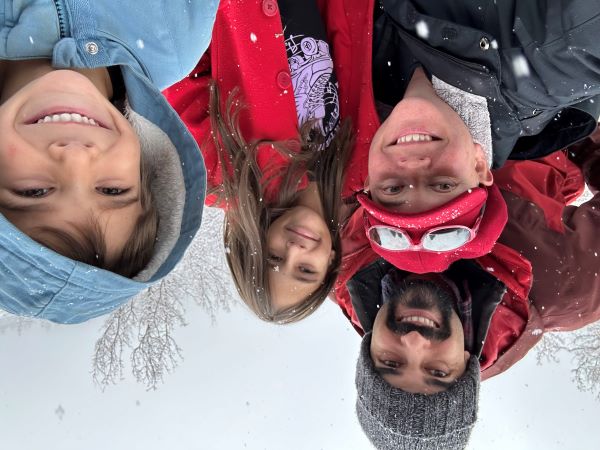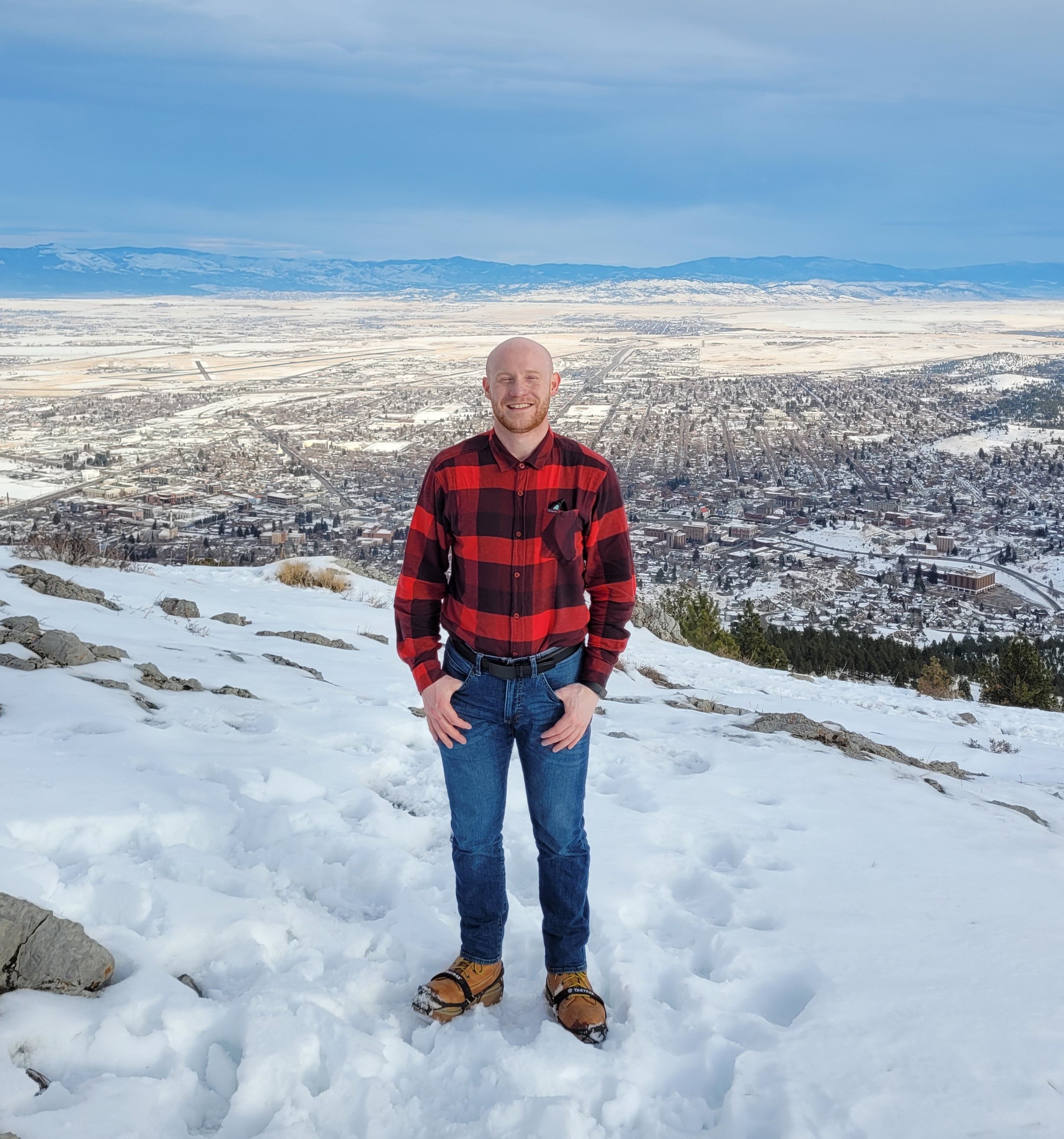Chasing Gold

Montana Tech’s history is steeped in mining. In the fall of 2005, then-chancellor Dr. Frank Gilmore initiated the National Student Awards Committee (NSAC) to mine for the highest level of student recognition available nationally. NSAC focused on the Goldwater Scholarship, long recognized as the premier undergraduate award for science, math, and engineering. The Goldwater program was established by Congress in 1986 as a key part of the Barry Goldwater Scholarship and Excellence in Education Foundation. Annually, about 400 sophomore and junior students with potential for transformative careers in the natural sciences, mathematics, and engineering are recognized as Goldwater Scholars. Dr. Gilmore eventually became the President of the Goldwater Foundation.

Dr. Marisa Pedulla was selected as the first chair of the committee and has continued to serve since. “Nineteen years guiding NSAC have been very fulfilling, working closely with outstanding, dedicated committee members and over three dozen extraordinary Montana Tech students. Getting to know the students and watching them grow as they formulate many iterative drafts of essays that require deep self-contemplation, research interests, and career trajectories is very rewarding,” she said. Pedulla went through the national award process herself when she was an undergraduate student at the University of Pittsburgh and was nominated for the Rhodes scholarship. Paying it forward has been part of her purpose.
In the 100 years prior to the NSAC, Montana Tech had one student recognized with this prestigious honor, Calley Jones (2000). Since NSAC was formed, 11 Montana Tech students have been honored, and an additional 5 have received honorable mentions.
The first two Goldwater Scholars since NSAC started were both graduates of Mathematics.
Chris Dienes (2007) completed his B.S. in 2008 before going on to earn his Ph.D. in Statistics at UC Davis in 2013. Chris now works as a data science manager at Amazon. Prior to Amazon he was a data scientist on research and development teams for both government and commercial organizations. While no longer working directly in research, he says, “I still leverage my knowledge of research while coaching junior scientists or setting the strategic direction for my applied science and software engineering teams.”
Dienes is now a parent of two, Harper (8 years old) and Austin (6 years old). “I encourage them to explore their passions and curiosities,” he said. “By diving deep into their open questions, they not only cultivate their interests, but also learn critical research skills such as navigating ambiguity, establishing hypotheses, deconstructing problems into manageable parts, and acquiring the reflex to seek data when confirming or disconfirming their beliefs.”
Asked to reflect on his Goldwater research, Dienes noted that his work did not require costly lab equipment, computer hardware, or travel expenses. So, after his scholarship funds sat in a savings account for a while, he used them to purchase an engagement ring for his future wife, Erin (Esp), who graduated from Tech a year ahead of him, also in Mathematics. Chris followed her to UC Davis for graduate school, where Erin earned her Ph.D. in Biostatistics.
Bob Hark (2012) earned B.S. degrees in Mathematics, Chemistry, and Statistics in 2013. Asked for advice for current students, he suggested, “try to focus a little earlier. I had little time for a social life while I was at Tech.”
Hark, who grew up in Eureka, MT, was a first-generation college student who first thought he’d study chemistry. By his second year at Tech, he leaned more into math and statistics. He completed his chemistry degree too, because, he said, “I’m not a quitter.”
His Goldwater-related research brought his disciplines together as he did computational chemistry using software to look at the shapes of molecules to model how they work together.
It was as a sophomore that Hark became committed to becoming an actuary. “I saw it as a profession that was comparable in prestige to something like a lawyer or doctor,” he explained. “It requires a unique skillset.”
Actuaries are experts in analyzing and managing risk and to do so they must have strong analytical skills, business knowledge, and an understanding of human behavior. Becoming a certified actuary requires passing a series of complex exams.
Hark achieved his M.S. in Statistics at UC Davis following his degrees from Tech. He began his career as an actuarial analyst in 2016 and has been working through the process of becoming certified ever since.
“There is really a strong research component in this work,” he said. “It requires investigation of data phenomenon that does not fit. It’s not scientific research, really, but it’s similar.”
Hark currently works as an actuarial analyst for Montana State Fund in Helena. He has just one exam requirement (Exam 6U) remaining for his Associate of the Casualty Actuarial Society (ACAS) credential.
“I’m happy I found this career path,” he said. “Coming back to Montana after working in California has been great. Earning this credential has been a long-time goal. It’s a lot of work, six four-hour long exams, courses on professionalism and ethics, college credits, etc. I’m almost there.”
Hark also recalled the assistance from NSAC, and Pedulla in particular. “Marisa was really great to work with,” he said. “I still keep tabs on Montana Tech. I loved the stuff I learned there. I can still mentally calculate the day of the week someone was born by their birth date. I use statistics every day.
Three of Tech’s recent Goldwater Scholars are spring 2024 graduates.
Baylie Phillips (2022) completed her B.S. in Metallurgical and Materials Engineering in spring 2023 and her M.S. in Materials Science and Engineering in May 2024. She said, “The NSAC committee provided helpful feedback and criticism regarding technical writing. They were also a great emotional support system throughout the Goldwater, Rhodes (2023 Finalist), and NSF GRFP application processes. I definitely could not have done the process as well without them. I owe a lot of my successes to them.” Phillips will begin her Ph.D. in Materials Science and Engineering with a focus on Biomaterials at the University of Washington in the fall of 2024.
Alyssa Plant (2023), from Helena, Montana, completed her B.S. in Environmental Engineering. She is starting her master’s degree here at Tech this summer and continuing her remote sensing research with a focus on mine waste reuse. She’ll also continue her Oredigger running career with the Cross-Country team in the fall.
Koby Martin (2023), also from Helena, earned his B.S. in Civil Engineering. “Since receiving the Goldwater Scholarship,” he said, “I have been connected to a network of professionals across many disciplines. The Goldwater scholarship not only looked great on my résumé, but served as a conversation starter during my interviews.” Martin has accepted a position as a structural engineer, designing large-scale commercial and industrial buildings across the U.S., with hopes of moving outside of the U.S. in the near future.
“The Goldwater scholarship, and mentoring I received from my advisors at Tech, allowed me to dedicate myself to my studies. I hope to carry that knowledge forward into my professional career,” he concluded.
Katherine Bonsell (2024) is the most recent Goldwater Scholar. A junior from Goleta, California, Bonsell is a non-traditional transfer student majoring in Geological Engineering. Her research is focused on investigating the direction of groundwater flow in Anaconda, Montana.
“I want to thank the Montana Tech National Student Awards Committee for guiding and encouraging me through the application process. I also want to thank my mentors and teachers here at Montana Tech, especially Dr. Mary MacLaughlin, Dr. Xiaobing Zhou, and Dr. Glenn Shaw,” she said. “It feels extremely encouraging to win this scholarship as a non-traditional transfer student in my first year at Montana Tech and I am proud of what I have accomplished.”
The NSAC continues to be deeply committed to helping talented students become broadly recognized for their efforts. In return, Montana Tech receives national notoriety and prestige. With six Goldwater Scholars in the last five cycles, they’ve hit the Goldwater Mother Lode and are optimistic about future prospects.
Montana Tech Goldwater Awardees:
2024: Katherine Bonsell, Goleta, CA, Geological Engineering, Mary MacLaughlin, Xiaobing Zhou, Glenn Shaw: Investigating the direction of groundwater flow in Anaconda, MT.
2023: Koby Martin, Helena/Butte, MT, Civil Engineering, Bret Robertson, Liping Jiang, and Jessica Daignault: Developing sustainable building materials, particularly concrete, using widely available biomaterials.
2023: Alyssa Plant, Helena, MT, Environmental Engineering, Dr. Raja Nagisetty: Applications of drone-based imagery in water quality, aquatic species health, and mine waste reuse.
2022: Baylie Phillips, Butte, MT, Metallurgical and Materials Engineering, Jerry Downey and Avimanyu Das: Exploring the complete life cycle of material, from fabrication, testing and evaluation, secondary processing techniques, and ultimately removing materials from environmental systems.
2021: Frankie Johnston, Highwood, MT, Geological Engineering, Mary MacLaughlin: Geomechanical properties of rock influence and react to seismicity to create an earthquake early warning system
2020: Kathryn Bozer, North Liberty, IA, Metallurgical and Materials Engineering: Career Goal: Ph.D. in Metallurgical Engineering. Research focus in scalable and sustainable extractive metallurgy processes for implementation in mining operations.
2018: Brent Sordo, Modesto, CA, Geological Engineering, Modesto CA: Career Goal, PhD in Civil Engineering and becoming a professor.
2016: Molly Brockway, Anchorage, AK, Metallurgical and Materials Engineering: Interdisciplinary research in materials science and bioengineering to address the forefront issues present in biomaterials.
2013: Joe Mitzel, Missoula, MT, Environmental Engineering: Career Goal: planned to complete a PhD in advanced wastewater treatment methods and perform research to develop novel technologies.
2012: Bob Hark, Statistics, Mathematics and Chemistry: Has since received a MS in Statistics from UC Davis, currently Actuarial Analyst at the Montana State Fund.
2007: Chris Dienes, Mathematics: Achieved PhD in Statistics from UC Davis, now a Data Science Manager for Amazon.
2000: Calley Jones, Livingston, MT, Mathematical Sciences minor in Liberal Studies.